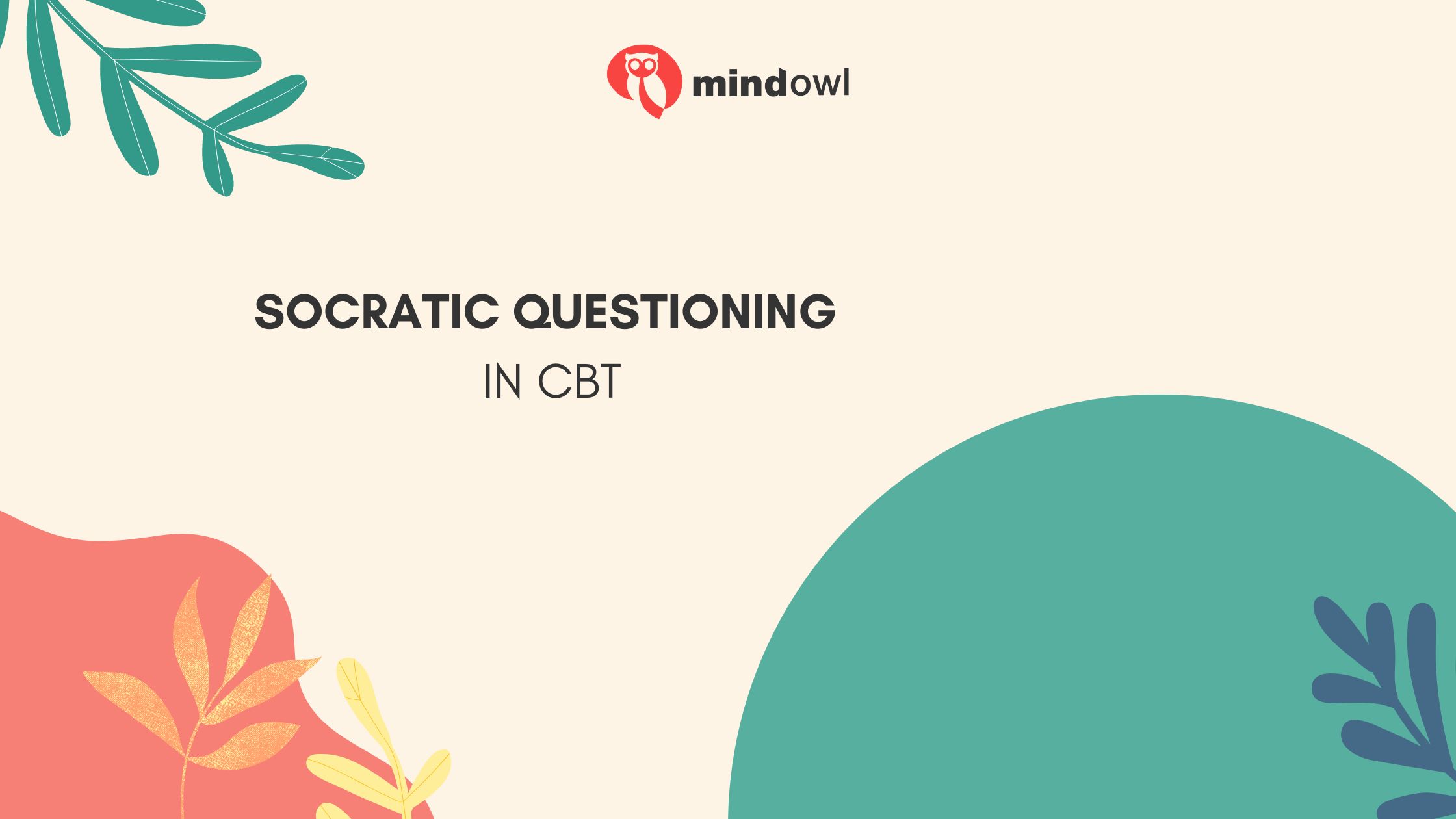
Have you ever found yourself trapped in a loop of negative thinking, unsure how to break free? Socratic questioning, a technique widely used in cognitive-behavioural therapy (CBT), can help unravel these thought patterns.
In this blog post, we’ll delve into the world of Socratic questioning – offering insights into its purpose and techniques while exploring practical exercises and helpful resources. Ready for some mental gymnastics that could change your life? Let’s dive right in!
Key Takeaways
- Socratic questioning is a technique used in cognitive – behavioral therapy (CBT) to challenge negative thoughts and beliefs.
- It involves asking open – ended questions, challenging irrational beliefs, and exploring alternative perspectives.
- Socratic questioning can help individuals overcome negative thinking patterns, resolve conflicts, make decisions, and improve their mental well-being.
What is Socratic Questioning in CBT

Socratic Questioning in CBT is a method used by therapists to engage clients in critical thinking and challenge their irrational beliefs.
Definition and purpose
Socratic questioning is a key part of CBT. It helps people see things in new ways. This method changes how they think and act. Therapists use it to make clients aware of their own thoughts, beliefs, and guesses.
The role of Socratic questioning is to help change thinking that isn’t helpful or right. By doing this, we can start to build more helpful and positive thoughts.
How it is used in therapy
Socratic questioning in CBT is a helpful tool for therapists. The therapist asks questions to guide their client. They want the client to think about their thoughts and feelings in a new way.
This can help the client see problems from other points of view. The questions are not hard or tricky. They make the clients think deeper into their own actions and words. The questions help them find out what they know but don’t realize yet.
It is a back-and-forth talk between the therapist and client, like a game of catch with ideas instead of balls! Over time, this helps change how people feel and behave for the better.
Benefits and effectiveness
Socratic questioning can make a big difference in cognitive behavioral therapy (CBT). It helps people change their bad thinking ways. It also aids to shift behaviors for the better.
The therapist guides them through this process. They ask questions to draw out what the person already knows but did not realize they knew. With the right use, Socratic questions have huge gains and help both the therapist and client during therapy sessions. For a deeper understanding of how CBT works, this guide on CBT therapy breakdown might provide additional insights: https://www.betterhelp.com/advice/therapy/cbt-therapy-a-breakdown/
Techniques and Examples of Socratic Questioning

Socratic questioning involves using open-ended questions, challenging irrational beliefs, and exploring alternative perspectives to help clients in therapy.
Using open-ended questions
Open-ended questions are an important part of Socratic questioning in CBT. They are designed to encourage reflection and promote deeper thinking. Here are some ways open-ended questions can be used:
- Ask questions that start with “how” or “why” to encourage clients to explore their thoughts and feelings more fully.
- Use questions that begin with “tell me about” or “describe” to prompt clients to provide more detailed information.
- Encourage clients to think creatively by asking questions like, “What other options could there be?” or “How else could you interpret this situation?”
- Ask questions that help clients explore the potential consequences of their thoughts and actions, such as, “What might happen if you continue to believe this?” or “How might things be different if you approached this differently?”
Challenging irrational beliefs
Challenging irrational beliefs is an essential part of Socratic questioning in CBT. By questioning these beliefs, therapists help clients examine if their thoughts are logical and accurate. This process encourages clients to explore the evidence for and against their beliefs. The goal is to replace irrational thoughts with more rational and positive ones. Below are some techniques used in challenging irrational beliefs:
- Asking open-ended questions: Therapists use open-ended questions to encourage clients to think critically about their beliefs. These questions prompt clients to provide evidence or alternative perspectives that contradict their irrational thoughts.
- Identifying cognitive distortions: Therapists help clients recognize common cognitive distortions such as black-and-white thinking, overgeneralization, and catastrophizing. By pointing out these distortions, therapists challenge clients to consider alternative interpretations.
- Exploring alternative perspectives: Therapists guide clients in examining different viewpoints related to their irrational beliefs. This helps clients gain a more balanced perspective on their situation and challenge their automatic negative thoughts.
- Providing supportive evidence: Therapists may offer counter-evidence or examples that contradict the client’s irrational belief. This helps clients see that there is another side to the story and encourages them to reevaluate their initial assumptions.
Exploring alternative perspectives
Exploring alternative perspectives:
- Socratic questioning in CBT helps individuals consider different points of view.
- It encourages them to look at a situation from various angles.
- By exploring alternative perspectives, people can gain a better understanding of their own beliefs and assumptions.
- This process allows for more flexible thinking and the possibility of finding new solutions.
- Examining different viewpoints can also help challenge negative thoughts and beliefs.
- It promotes cognitive flexibility and open – mindedness.
- Exploring alternative perspectives is a key component of cognitive restructuring in CBT.
- By examining different possibilities, individuals can develop more balanced and accurate views.
Applications of Socratic Questioning
Socratic questioning can be applied to various areas, such as cognitive restructuring, overcoming negative thinking patterns, and resolving conflicts and decision-making. Discover how this powerful technique can help you transform your thoughts and beliefs for a more fulfilling life.
Cognitive restructuring
Cognitive restructuring is an important part of cognitive-behavioral therapy (CBT). It helps people identify and change their negative thinking patterns. By challenging these unhelpful thoughts, individuals can learn to replace them with more positive and realistic ones.
This process involves recognizing distorted or irrational beliefs, questioning their accuracy, and finding evidence that supports alternative perspectives. Cognitive restructuring is effective in helping individuals overcome negative thinking patterns and improve their mental well-being.
Overcoming negative thinking patterns
Negative thinking patterns can be harmful and have a significant impact on our mental well-being. In cognitive-behavioral therapy (CBT), overcoming negative thinking patterns is a crucial goal.
Socratic questioning is an effective technique used in CBT to help individuals challenge and change these negative thoughts. By using open-ended questions, therapists encourage clients to explore the evidence behind their negative beliefs and consider alternative perspectives.
This process allows individuals to gain insight into their thought patterns, identify any irrational or unhelpful thoughts, and develop more balanced and realistic ways of thinking.
Resolving conflicts and decision-making
Socratic questioning can be a helpful tool when it comes to resolving conflicts and making decisions. By using open-ended questions, Socratic questioning helps individuals explore different perspectives and challenge their own beliefs.
This process encourages critical thinking and reflection, which can lead to more effective problem-solving and decision-making. In therapy or coaching sessions, the therapist or coach may guide the individual through Socratic questioning to help them consider alternative options and understand the underlying reasons behind their conflicts or choices.
This approach promotes self-awareness and empowers individuals to find resolutions that align with their values and goals.
Socratic Questioning Outside of Therapy
Socratic questioning can also be applied outside of therapy, such as in Socratic circles and seminars, as well as in coaching sessions.
Socratic circles and seminars
Socratic circles and seminars are educational approaches that use the Socratic method to explore and understand different perspectives. They involve group discussions where participants ask open-ended questions, challenge assumptions, and share their thoughts.
These techniques can be used in teaching and counseling to promote critical thinking skills, deepen understanding of a topic, and address issues related to anxiety or other mental health concerns.
The belief behind Socratic circles and seminars is that through questioning and dialogue, individuals can gain new insights, clarify their thoughts and feelings, and generate productive discussions.
Using Socratic questioning in coaching
Socratic questioning is a helpful tool in coaching to promote reflection and problem-solving thinking. In coaching, Socratic questioning involves asking a series of graded questions to raise awareness and guide individuals towards finding their own solutions.
This approach encourages critical thinking skills and helps clients explore different perspectives, challenge limiting beliefs, and develop new insights. By using Socratic questioning in coaching sessions, individuals can gain clarity, identify obstacles, and create effective strategies for personal growth and development.
It is an empowering method that allows clients to take ownership of their goals and find meaningful solutions to various challenges they may face.
Helpful Techniques for Socratic Questioning
In Socratic questioning, helpful techniques include using the five Ws, following the steps of the Socratic method, and engaging in role-playing exercises.
The five Ws
- The five Ws are a helpful technique used in Socratic questioning.
- They stand for Who, What, Where, When, and Why.
- These questions help to explore different aspects of a situation or belief.
- Who is involved in the situation?
- What is happening or being discussed?
- Where does this take place?
- When did it occur or when will it happen?
- Why is this important or relevant?
Steps of the Socratic method
The Socratic method involves a series of steps to facilitate critical thinking and problem-solving. Here are the steps:
- Establish a clear purpose or goal for the questioning.
- Begin by asking open-ended questions that encourage reflection and self-exploration.
- Listen actively to the client’s responses, showing genuine curiosity and interest.
- Ask follow – up questions that challenge irrational beliefs or assumptions.
- Encourage the client to explore alternative perspectives and consider different solutions.
- Guide the conversation towards cognitive restructuring and challenging negative thinking patterns.
- Use probing questions to help the client gain insight into their thoughts, emotions, and behaviors.
- Allow for silence and reflection during the questioning process.
- Summarize key insights and discoveries made throughout the conversation.
Role-playing exercises
Role-playing exercises can be helpful techniques for Socratic questioning in CBT. They require students to identify and defend their positions regarding their thoughts and beliefs. These exercises help clients develop critical thinking skills and encourage deeper exploration of their emotions and behaviors. By assuming different roles in a hypothetical scenario, clients can gain new perspectives and challenge their negative thinking patterns. Role-playing exercises are often used in therapy sessions to teach clients how to effectively use Socratic questioning in real-life situations.
Exercises and Worksheets for Socratic Questioning
In this section, we will explore various exercises and worksheets that can be used to enhance the practice of Socratic questioning.
Different types of Socratic questions
There are different types of Socratic questions that can be used in therapy. These questions are designed to encourage reflection and critical thinking. Here are some examples:
- Clarifying Questions: These questions help to gain a clear understanding of the client’s thoughts or beliefs. For example, “Can you explain what you mean by that?” or “Can you give me an example?”
- Probing Questions: These questions dig deeper into the client’s thoughts or beliefs to explore their underlying assumptions or reasons. For example, “Why do you think that is true?” or “What evidence do you have to support that belief?”
- Challenging Questions: These questions challenge the client’s irrational or negative beliefs and encourage them to consider alternative perspectives. For example, “What other explanations could there be for this situation?” or “How would someone else view this situation?”
- Eliciting Questions: These questions help the client to uncover their own answers and insights by prompting them to think more deeply about their thoughts and feelings. For example, “What do you think is the underlying cause of your emotions?” or “How does this belief affect your behavior?”
- Hypothetical Questions: These questions create hypothetical scenarios to help the client explore alternative ways of thinking or behaving. For example, “If you didn’t have this belief, how would your actions change?” or “What might happen if you approached this situation differently?”
Cognitive restructuring worksheets
Cognitive restructuring worksheets are important tools used in CBT.
Life coaching question prompts
Life coaching question prompts are useful tools in Socratic Questioning CBT. They can help individuals explore different perspectives, clarify their thoughts and feelings, and generate new insights. Here are some examples of life coaching question prompts:
- What are the underlying beliefs or assumptions behind your current thinking?
- How might a different perspective change your understanding of the situation?
- What evidence do you have to support your current thoughts or beliefs?
- What alternative explanations or interpretations could there be for this situation?
- How do your thoughts and beliefs impact your emotions and behaviors?
- What would happen if you approached this situation with a more positive mindset?
- How can you challenge any irrational or unhelpful thoughts that arise?
- What steps can you take to promote self – discovery and personal growth in this area?
Recommended Books on Socratic Questioning
If you want to delve deeper into the world of Socratic questioning, here are some recommended books that can enhance your understanding and practice: “The Clinician’s Guide to the Treatment of Obesity” by Donna Baick, “Cognitive Therapy Techniques for Children and Adolescents” by Robert D.
Friedberg and Jessica M. McClure, “Socratic Method in Psychology: An Introduction” by Christopher P. Holmes, and “A Guide to Rational Living” by Albert Ellis. Expand your knowledge with these insightful reads!
Suggested reading for further exploration
If you’re interested in further exploring Socratic questioning in CBT, here are some recommended books:
- “CBT Made Simple: A Clinician’s Guide to Practicing Cognitive Behavioral Therapy” by Nina Josefowitz and David Myran
- “Socratic Method and Critical Philosophy: Selected Essays” by Leonard Nelson
- “CBT Worksheets: CBT Worksheets for CBT therapists in training” by Dr. James Manning and Dr. Nicola Ridgeway
- “Socratic Questioning for Therapists and Counselors: Learn How to Think and Intervene Like a Cognitive Behavior Therapist” by Scott H. Waltman, R. Trent Codd, III, Lynn M. McFarr, Bret A. Moore
- “Cognitive – Behavioral Therapy Skills Workbook” by Barry Gregory and Susan Richardson
Conclusion
In conclusion, Socratic questioning is a valuable technique in cognitive-behavioral therapy (CBT) that helps individuals challenge their negative thoughts and beliefs. By asking thoughtful questions and promoting self-reflection, therapists can guide clients toward making positive changes in their emotions and behaviors.
Socratic questioning not only enhances problem-solving skills but also fosters a deeper understanding of oneself. Overall, incorporating this technique into therapy sessions can lead to more effective outcomes for individuals seeking help with anxiety, depression, and other issues.
FAQs
Q: What is Socratic questioning in CBT?
A: Socratic questioning in CBT refers to the use of the Socratic method, a form of questioning developed by Socrates, in Cognitive Behavioral Therapy. It is a technique used by therapists to guide clients in challenging their negative thinking patterns, exploring their beliefs, and promoting self-discovery.
Q: How is Socratic questioning used in psychology?
A: Socratic questioning is widely used in psychology, particularly in cognitive therapy for depression, anxiety, and other mental health disorders. By asking thought-provoking questions, therapists can help clients examine their thoughts, assumptions, and beliefs, leading to a deeper understanding of their emotions and behaviors.
Q: Why is Socratic questioning considered an important aspect of CBT?
A: Socratic questioning is considered a cornerstone of Cognitive Behavioral Therapy because it helps clients identify and challenge their negative thoughts and beliefs, which are often at the root of their emotional distress. By actively engaging clients in the process of questioning their thinking, therapists can assist in symptom change and promote more positive and realistic thought patterns.
Q: How does Socratic questioning help in changing negative thinking?
A: Socratic questioning helps in changing negative thinking by encouraging individuals to examine the evidence for their negative thoughts and consider alternative perspectives. By challenging distorted thinking patterns and replacing them with more rational and balanced thoughts, Socratic questioning promotes cognitive restructuring and symptom reduction.
Q: Is Socratic questioning an effective cognitive therapy technique?
A: Yes, Socratic questioning is considered an effective cognitive therapy technique. Research has shown that it can lead to significant symptom change in cognitive therapy for various psychological disorders, including anxiety and depression.
Q: How does a therapist use Socratic questioning in a session?
A: During a therapy session, a therapist may use Socratic questioning to help a client become aware of their thoughts and beliefs, challenge any negative or irrational thinking, explore alternative perspectives, and guide the client towards more adaptive and helpful thoughts and behaviors.
Q: Is Socratic questioning used in private practice?
A: Yes, Socratic questioning is commonly used in private practice by therapists who employ cognitive-behavioral approaches. The technique can be tailored to fit individual client needs and can be a valuable tool in promoting self-reflection and personal growth.
Q: Can I use Socratic questioning on my own without a therapist?
While it’s possible to use some aspects of Socratic questioning on your own, it’s generally more effective when used with guidance from a trained therapist who can provide support, feedback, and help you navigate through challenging thoughts and emotions.
Q: What is the effect of Socratic questioning in cognitive therapy?
A: The effect of Socratic questioning in cognitive therapy is to facilitate the process of challenging and modifying automatic negative thoughts and beliefs. By engaging clients in a guided discovery process, Socratic questioning promotes cognitive flexibility and helps individuals develop more adaptive ways of thinking.
Q: How does Socratic questioning relate to cognitive behavioral therapy?
A: Socratic questioning is a fundamental technique within cognitive-behavioral therapy. It is used to challenge and modify maladaptive thoughts and behaviors by guiding clients towards a more rational and balanced perspective. Socratic questioning is an essential tool in the cognitive restructuring process used in CBT.
Q: What are some other terms related to Socratic questioning and CBT?
A: Some other terms related to Socratic questioning and CBT include cognitive behavioral therapy, behavior therapy, cognitive therapy for depression, existential therapy, therapist use of Socratic questioning, depressive symptoms, anxiety disorders, and the effective use of the Socratic method.
MindOwl Founder – My own struggles in life have led me to this path of understanding the human condition. I graduated with a bachelor’s degree in philosophy before completing a master’s degree in psychology at Regent’s University London. I then completed a postgraduate diploma in philosophical counselling before being trained in ACT (Acceptance and commitment therapy).
I’ve spent the last eight years studying the encounter of meditative practices with modern psychology.

